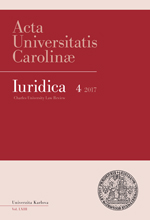Hans Kelsen na prahu 21. Století
Hans Kelsen at the beginning of the 21st Century
Author(s): Herbert SchambeckSubject(s): Law, Constitution, Jurisprudence
Published by: Univerzita Karlova v Praze, Nakladatelství Karolinum
Keywords: Hans Kelsen; theory of law; hierarchical theory of norms; derogatory power; international courts; constitutional law; European law
Summary/Abstract: Hans Kelsen (1881–1972) led a long and diverse life – he was born into the multinational Austrian empire, experienced several political regimes, both democracy and totalitarianism, and he lectured on several universities in Europe (on the German University of Prague, among others) and in the USA. In a way, Kelsen’s body of work reflects his life, it is just as rich, reaching from the theory of law to the constitutional and international law. In the legal theory, Kelsen hoped to create ‘pure’ – objective, exact and value-neutral – theory of law, unburdened by psychology, sociology or political theory. The aim of the legal theory should be to describe and analyse applicable law, not to concern itself with law as it should be – the latter should be left to ‘legal politics’ and has no place in the pure theory. Kelsen’s hierarchical theory of norms (originally created by his pupil Merkl), which states that all national legal rules are part of one hierarchical structure, with higher norms having derogatory power over lower norms and the constitutional law on the top of the structure governing the procedure for the creation of all positive law within the state. As for international law, Kelsen promoted the existence of international courts as bodies to maintain international peace. These ideas, as well as his other theories, shows that Kelsen was truly ‘a man standing outside one specific era’, whose work is relevant to this date.
Journal: Acta Universitatis Carolinae Iuridica
- Issue Year: 63/2017
- Issue No: 4
- Page Range: 145-154
- Page Count: 10
- Language: Czech

